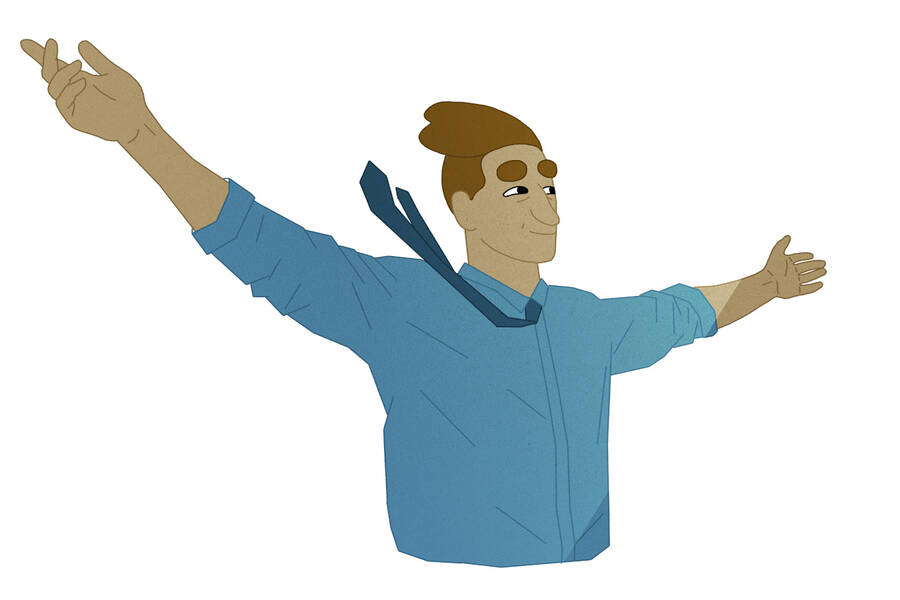Organizations Feb 1, 2022
What the Psychology of Resilience Can Tell Us About Enduring the Pandemic
Plus, what organizations can do to help their employees cope.

Yevgenia Nayberg
Many of us are by now beyond exhausted by the stress of balancing work, life, and possibly caregiving during a pandemic.
“Psychologically, we all have long COVID by this point,” says Lauren Eskreis-Winkler, an assistant professor of management and organizations at the Kellogg School. While we may or may not have suffered the effects of the virus directly, its residual impacts on all of us are real.
In her research, Eskreis-Winkler seeks to understand resilience. In broad terms, she says, resilience includes both whether we recover from challenges and how quickly we bounce back from them.
Eskreis-Winkler explains why it has been so difficult to be resilient during covid. She also offers tips for how organizations can help their employees keep bouncing back.
You Are Probably Failing. A Lot.
Given all of the challenges associated with COVID, you may simply have to accept that you will not succeed as much as you might have in the past.
Perhaps you are struggling to communicate or feel connected with colleagues in a remote environment. Perhaps you are straining to cover for sick colleagues, or those who have left the organization in the Great Resignation, and falling short. Or perhaps external stressors have you feeling distracted as you try to work.
Failing once or twice isn’t necessarily a problem, Eskreis-Winkler notes. We are asked to bounce back from short-term, one-time setbacks all the time.
But over time, these failures can add up. It can be hard to stay resilient when your struggles continue, with no end in sight.
Research on populations who face repeated failures (like smokers who struggle to quit) confirms that this pattern negatively impacts people’s ability to rally. “Repeated failures affect not just your sense of hope and optimism, but your confidence in yourself,” Eskreis-Winkler says. “It’s exhausting.”
People Struggle to Learn from Failure
Another reason this current moment is so trying for many is that, despite experiencing a lot of failure, we’re not necessarily learning from our mistakes or getting any better at adapting to challenging situations.
“You think, ‘I thought I figured this out. I thought I knew how to work from home,’” Eskreis-Winkler says. “Then you find yourself repeatedly struggling with the same issues.”
“It turns out, most of us don’t learn very much from our failures.”
— Lauren Eskreis-Winkler
This lack of progress or learning can be a tough pill to swallow. After all, have you ever attended a commencement speech or read an interview with a CEO that doesn’t glorify failure as a teachable moment, leading to great future successes?
“We live in a culture where failure is celebrated,” Eskreis-Winkler says. “People believe there’s a silver lining in every failure: at least they’ll learn from the experience.”
But alas, she says, this is often not the case. “It turns out, most of us don’t learn very much from our failures.”
In one recent study, Eskreis-Winkler asked nurses to guess how much their colleagues would learn from mistakes at work. Nurses predicted—incorrectly—that their colleagues would learn a lot more from failure than they actually did.
Why do people struggle to learn from failure?
Eskreis-Winkler says that failure threatens our egos. Facing failure makes us feel bad. So we tune it out to avoid the discomfort.
“People often choose to disengage. They choose not to attend to their failures, and as a result, they learn very little.” We tend to put our failures behind us, recall less about them, and avoid reflecting enough to learn from them.
A Way Forward
The good news, Eskreis-Winkler says, is that thoughtful interventions can help us shape our work cultures to build more resilience.
For one, even though we resist learning from our own mistakes, we are inclined to draw lessons from our wins—as well as others’ experiences, no matter the result.
“People do not struggle to learn from their own success. Nor do they struggle to learn from others’ failures,” Eskreis-Winkler says, “Someone else’s failure is not upsetting or threatening. It’s just information.”
Organizations should keep this in mind when training managers in how to give feedback. “There’s a science to delivering negative feedback because people are so incredibly sensitive to perceived failure,” Eskreis-Winkler says. “Negative feedback needs to be delivered in a thoughtful way that is not ego-threatening if managers want employees to attend to it and learn.”
Another thing organizations can do to support resilience among employees is encourage people to speak openly about their failures. “In many work cultures, no one knows just how common failure is,” Eskreis-Winkler says.
Specifically, she advises that leaders be transparent, and even analytic, about failed campaigns, product launches, and other projects.
“Business leaders can create cultures where the actual rate of success and failure is known to each employee,” Eskreis-Winkler says. “This normalizes failure in an organization, creating an environment where a certain rate of failure for new products and initiatives is totally acceptable. This knowledge alone makes people less upset by personal failure, and as a result, more likely to learn from it.”
This may be challenging for companies with performance-driven bottom lines. But it’s the best way to encourage smart risk-taking during a time when employees may be particularly loath to fail yet again.
“Strong leaders acknowledge that failure is part of the process,” she says. “This helps reduce the stigma associated with failure, which makes it less threatening, and in turn, helps people learn.”
Finally, it could help to rethink what is actually meant by “failure.” And it can help to refrain from immediately classifying experiences as either “wins” or “losses.”
“People mistakenly think progress is linear,” Eskreis-Winkler says. “But true resilience is more circular. Tough experiences can set you three steps back. When approached in the right way, those experiences harbor lessons that build resilience for the future.”
Susan Margolin is a writer based in Boston.



